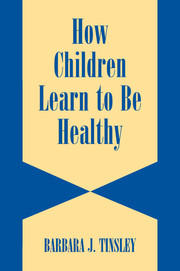Book contents
- Frontmatter
- Contents
- Acknowledgments
- How Children Learn to Be Healthy
- Introduction
- 1 Mechanisms and Consequences of Socializing Children to Be Healthy
- 2 Children's Health Understanding and Behavior
- 3 Parents' Health Beliefs
- 4 Parents' Promotion of Their Children's Health
- 5 Parents' Promotion of Their Children's Sexual Health
- 6 Peers, Schools, and Children's Health
- 7 How Television Viewing and Other Media Use Affect Children's Health
- 8 The Social Ecology of Children's Health Socialization
- 9 Summary and Conclusions
- References
- Index
3 - Parents' Health Beliefs
Published online by Cambridge University Press: 27 July 2009
- Frontmatter
- Contents
- Acknowledgments
- How Children Learn to Be Healthy
- Introduction
- 1 Mechanisms and Consequences of Socializing Children to Be Healthy
- 2 Children's Health Understanding and Behavior
- 3 Parents' Health Beliefs
- 4 Parents' Promotion of Their Children's Health
- 5 Parents' Promotion of Their Children's Sexual Health
- 6 Peers, Schools, and Children's Health
- 7 How Television Viewing and Other Media Use Affect Children's Health
- 8 The Social Ecology of Children's Health Socialization
- 9 Summary and Conclusions
- References
- Index
Summary
Parents influence their children's health through a variety of mechanisms, including their beliefs and behavior. This chapter will examine how parents' beliefs and behavior affect children's health attitudes, behavior, and outcomes.
Parents' Health Beliefs
Studies of parents' attitudes and beliefs suggest that parental socialization practices are guided by parents' attitudes toward and understanding of child development and behavior (cf. Grusec, Goodnow, & Kuczynski, 2000; Sigel & Dorval, 2000) within cultural contexts (Harkness & Keefer, 2000). Data supporting these relations are found most prominently in the domains of cognitive development (Miller, 2000; Sigel & Dorval, 2000) and social development (Simpkins & Parke, 2001). However, a major way in which parents influence children's health is related to their attitudes about health, and usually function via their influence on parents' behavior rather than by interaction with the child (Loveland-Cherry, Leech, Laetz, & Dielman, 1996). Studies of parents' attitudes and beliefs concerning their children's health suggest that these are important factors in parents' health behavior on behalf of their children and their socialization of children's health behavior. Parental behaviors on behalf of children's health and supervision of their children's health-related behaviors seem to reflect the parental caregiving role and parental control of many aspects of young children's behavior (Hartup, 1979). Lau and his colleagues (Lau, Quadrel, & Hartman, 1990) found that mothers influenced their children either indirectly, through the transmission of health beliefs, or directly through explicit training in four areas of health behavior: exercise, diet, alcohol use, and seat belt use.
- Type
- Chapter
- Information
- How Children Learn to be Healthy , pp. 27 - 38Publisher: Cambridge University PressPrint publication year: 2002

